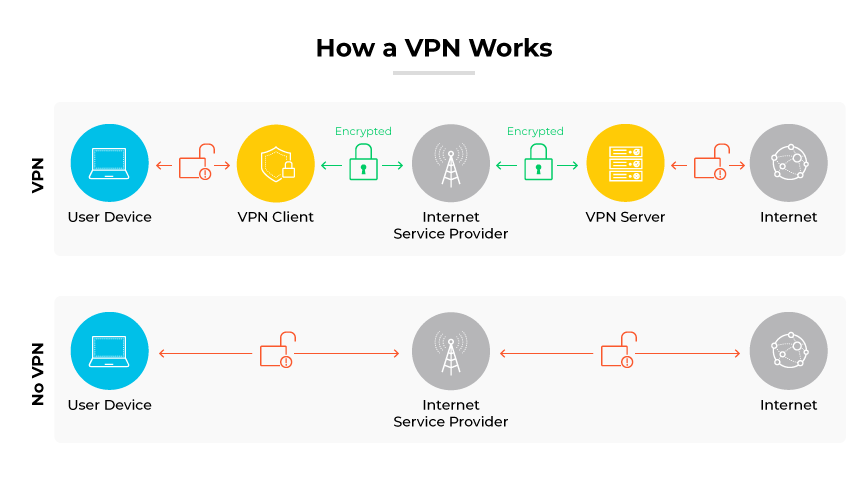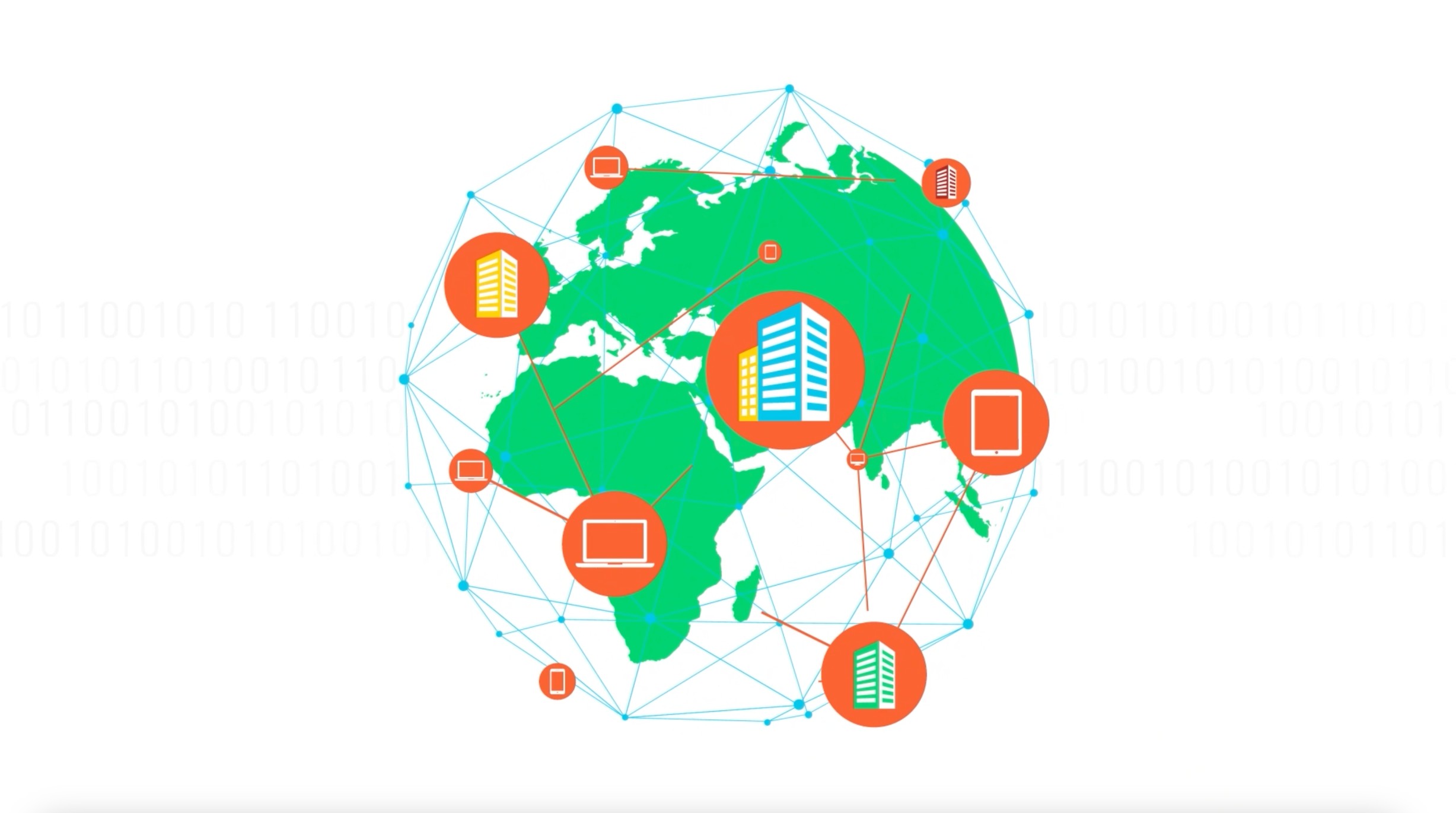What Are the Benefits of a VPN (Virtual Private Network)
The benefits of using a VPN include secure data transmission, enhanced productivity, secure remote access, and longstanding dependability.
By encrypting data and providing secure access, VPNs allow employees to work remotely from any location, ensuring the integrity and confidentiality of corporate communications. The importance of VPN technology in enterprise network security is well established, offering a reliable solution for organizations worldwide.
What Is a VPN and How Does It Work?

VPN function shown by routing encrypted data from a device through a VPN client and server to the internet, compared to a direct connection.
A VPN (virtual private network) creates a secure connection over the internet, encrypting data flow between devices.
This secure link protects confidential data from potential cyberthreats and unauthorized breaches. Within corporate settings, VPNs provide a reliable means of remote access to the company's network, preserving the privacy and integrity of data.
A VPN establishes a protected passageway known as a tunnel. Information from a device using a VPN is concealed and transmitted through this tunnel. When connected to a VPN, a device behaves as if it is on the VPN's own network. The virtual private network manages both the incoming and outgoing data for the device through its secure connection, ensuring a protected pathway for remote users.
VPNs channel data through a secure tunneling protocol, with the data encrypted to block unauthorized entities. Widely recognized encryption standards include Transport Layer Security (TLS) and Internet Protocol Security (IPsec). Encryption transforms data into a format that can only be read with a specific key. The protocol then bundles the data, addressing it to the intended recipient. A system checks the user's credentials, grants access, and logs the session's activity.
A virtual private network masks a device's true IP address by diverting its internet route through a server at a different location. This gives the impression that the device's internet requests originate from the VPN server's location, not its actual geographic location, thereby concealing the true source of the connection.
The Need for Enterprise VPNs
By hiding the connection's origin and data exchanged, a VPN provides a dual layer of protection and confidentiality. Individuals often use VPNs for maintaining personal privacy or circumventing geographical internet restrictions (to access streaming services, for example). Businesses use VPNs for a wider range of purposes. For enterprises, VPNs are crucial for safeguarding sensitive information, adhering to corporate policies, and ensuring steady remote connectivity to essential company applications.
VPN Benefits
| Benefit | Description |
|---|---|
| Global Connectivity and Point-to-Point Remote Access | Enables secure, reliable connections across geographic boundaries without physical infrastructure, facilitating business expansion and remote site integration. |
| Enhanced Productivity | Allows employees to access corporate resources from any location, reducing the need for physical presence and enabling flexible work environments. |
| Security for Data in Transit | Encrypts data over untrusted networks, protecting against unauthorized access and cyberthreats with protocols like IPsec. |
| Longstanding, Durable Technology | A proven, reliable technology offering a secure method for remote data access and integration with various network configurations. |
Global Connectivity and Point-to-Point Remote Access
In today's interconnected world, a VPN (virtual private network) is a critical tool for organizations that need to provide global connectivity and point-to-point remote access. VPNs facilitate the creation of secure, reliable connections across geographic boundaries, allowing businesses to expand their reach without establishing physical infrastructure in each new location. This technology allows for the extension of a central network to remote sites, effectively bringing the network to the VPN user, wherever they may be.
This capability eliminates the need to construct extensive network setups in every new branch. Organizations can establish a branch office with a minimal physical presence, significantly reducing the time and resources typically required for such expansions. The ability to transmit data securely from a central hub to remote branches ensures all parts of a business can operate with the same efficiency and access to resources as the headquarters.
The agility offered by VPNs means businesses can move quickly to set up operations in new markets. Deploying a VPN headend box and connecting it to hub or spoke boxes in various locations can be done quickly, allowing companies to become operational in a fraction of the time it would traditionally take. This swift, flexible expansion capability is helpful in a corporate landscape where speed to market can provide a competitive edge.
VPNs provide a secure, established, and efficient way to support business growth and maintain productivity. By using VPN technology, organizations can ensure employees have consistent access to the necessary tools and data, enabling them to perform duties effectively, regardless of physical location. This seamless integration of remote access into the corporate network architecture underscores the VPN's role as a foundational component of modern business operations.
Enhanced Productivity
Enhanced productivity is a major VPN advantage to enterprises. By extending the reach of the corporate network, VPNs enable employees to access resources and services from any location as if they were on-site. Remote connectivity minimizes the need for physical presence and allows for a flexible work environment, which is crucial in today's mobile and global business landscape.
With VPNs, the concept of the workplace is redefined. Employees no longer need to be tied to a physical office location to access the company's network. This saves time that might otherwise be spent commuting and allows for a swift response to business needs. The ability to access the network remotely translates into increased efficiency and productivity, as remote work can continue uninterrupted by location constraints.
VPNs facilitate productivity by creating a secure, encrypted tunnel through which data can travel safely over public or unsecured networks, whether at home or in a coffee shop. Applications, security protocols, and data reside in the central network but are made available to remote VPN users through the encrypted connection. As a result, employees can perform tasks with the assurance that they have secure access to the same tools and data as if they were in the office.
The centralization of resources simplifies IT management and reduces the need to duplicate infrastructure across multiple locations. Resulting efficiency not only leads to cost savings but also ensures all remote employees are working with the most up-to-date information and applications. The streamlined access provided by VPNs fosters a cohesive working environment that is conducive to productivity.
The agility offered by VPNs is a key contributor to the enhanced productivity of organizations. It ensures the workforce remains connected, collaborative, and responsive.
Security for Data in Transit
Securing data in transit is one of the most significant benefits provided by VPN technology. This security is critical in an era where data breaches and information theft are prevalent threats. A VPN addresses these issues by encapsulating user data in encrypted packets before it traverses any network, especially the internet, which is inherently unsecure. This process, known as encryption, transforms readable data into scrambled code that only authorized recipients can decipher.
The encryption protocols used, such as IPsec, IKEv1, and IKEv2, establish a secure encrypted tunnel for data packets. These protocols are a set of rules ensuring that data sent over an untrusted network remains confidential and intact. They provide a shield that prevents unauthorized access, ensuring sensitive information remains private as it moves from one location to another.
The ability to securely connect different branches and remote workers without the need for dedicated telecommunication circuits reduces operational costs and streamlines the process of opening new locations. Secure connectivity allows for rapid scaling of business operations without compromising on the security of data being transmitted across the network.
The productivity of an organization is enhanced when workers can collaborate safely and access resources confidently, regardless of the network they are using. This peace of mind is invaluable, as it allows team members to focus on core responsibilities without the concern of data compromise.
Longstanding, Durable Technology
VPN technology is longstanding and durable in nature. It has been rigorously tested and proven over decades. Organizations across the globe rely on VPNs for a critical reason: they provide reliable protection for data in transit. This reliability comes from years of refinement and a strong track record of securing enterprise communications.
VPNs have evolved into a mature technology that integrates seamlessly with various network configurations. Their durability stems from being battle-tested in diverse environments, from small businesses to large enterprises. This extensive deployment history gives organizations confidence in VPNs’ ability to safeguard their data. VPNs do not require organizations to venture into the unknown or invest heavily in training and implementation.
The consistent dependability of VPN technology means it functions akin to essential networking hardware like routers and switches. Virtual private networks are a familiar system that IT departments can trust and manage without the need for constant oversight or troubleshooting. This aspect of VPN technology saves time and allows IT teams to focus on strategic initiatives rather than day-to-day network security concerns.
The value of VPNs as a longstanding, durable technology is clear. They offer a tried and true solution for secure, remote data access — a function that is increasingly important in today's mobile, dynamic business environment. With VPNs, organizations can rest assured their data is protected by a technology that has stood the test of time and will continue to be a reliable part of network security infrastructures for years to come.
